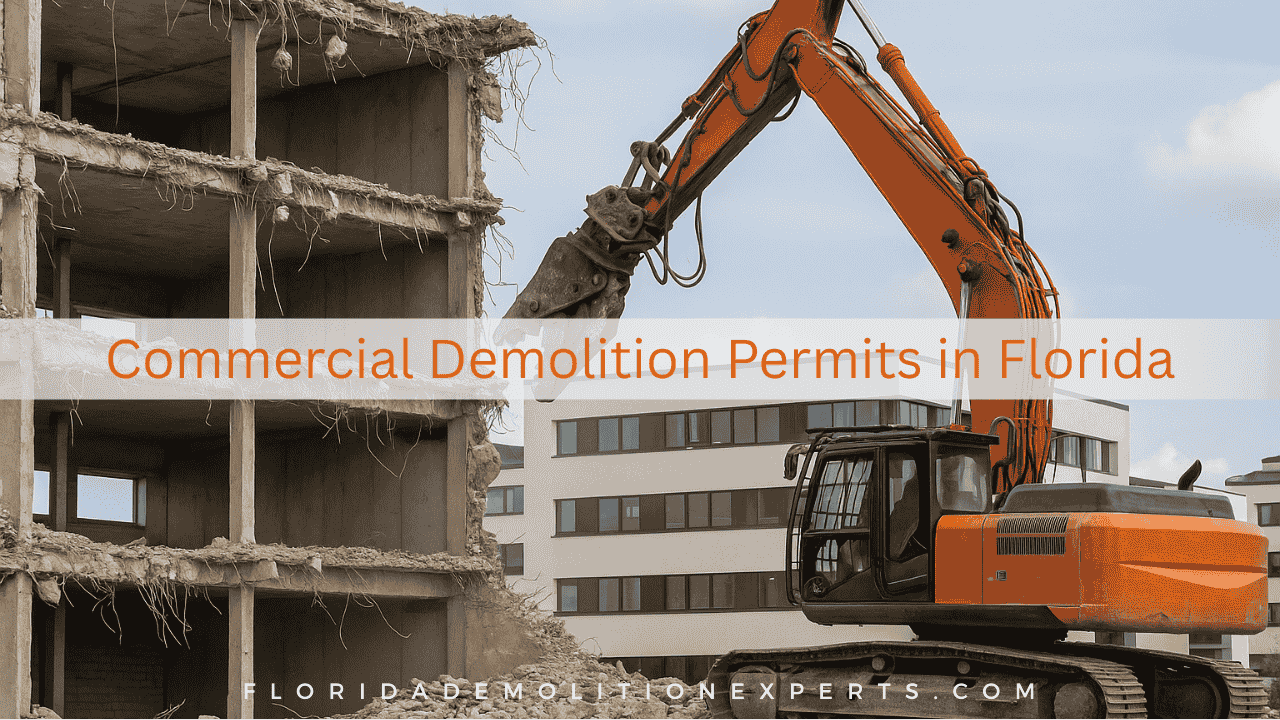Planning to demolish a commercial building in Florida, but unsure about the permits you’ll need? For many business owners, demolition seems easy: bring in heavy machinery and clear the site. However, the real challenge begins in Florida long before the first wall comes down.
Commercial demolition permits are a formality and a legal requirement that can make or break your project timeline, budget, and compliance record.
This guide unpacks everything you need about Florida commercial demolition permits, from requirements and costs to timelines, inspections, and the mistakes that trip up many business owners.
Why Demolition Permits Are Essential in Florida
Florida isn’t just another state when it comes to construction and demolition. Between hurricane-resistant building codes, historic preservation rules, and coastal environmental protections, demolition projects face stricter oversight here than in many parts of the U.S.
Need details on residential demolition permits? Please read our complete guide here.
Without the proper permits:
- Inspectors can shut down your project.
- You risk fines and legal penalties.
- Insurance may refuse to cover damages.
- Delays can snowball, costing thousands in lost time.
A permit isn’t paperwork; it’s your legal clearance to proceed.
Who Issues Demolition Permits in Florida?
Permits are usually issued at the city or county level, not statewide. For example:
- Miami-Dade and Broward counties have separate permitting offices.
- Orlando requires different documentation than Tampa.
- Coastal counties may involve the Florida Department of Environmental Protection (DEP) for environmental review.
Expect additional approvals if your property is near wetlands, beaches, or historical districts.
What Documents Do You Need for a Florida Demolition Permit?
The exact requirements vary by municipality, but most applications will require:
- A demolition plan showing how the building will be safely removed.
- Site survey and structural report prepared by licensed professionals.
- Utility disconnection letters from power, gas, and water companies.
- Asbestos and hazardous material inspection reports for older buildings.
- Waste management or recycling plan, especially in Miami-Dade and Orange counties.
Failing to submit an asbestos report in some Florida cities is the number one reason permit applications are rejected.
How Much Do Florida Demolition Permits Cost?
Permit fees are generally based on building size and type. While costs differ by county, typical ranges include:
- Small retail/office space: $200 – $500
- Mid-size commercial buildings: $500 – $1,500
- Large or complex structures: $2,000+
Please note that this does not include asbestos inspections, environmental studies, or utility disconnect fees, which add to total costs.
Common Mistakes That Delay Demolition Permits
Many Florida business owners lose weeks or even months because of overlooked details. The most frequent mistakes include:
- Skipping asbestos testing – mandatory for older structures.
- Failing to disconnect utilities before applying.
- Submitting incomplete site plans without a licensed surveyor’s approval.
- Ignoring local recycling mandates for debris disposal.
- Underestimating review times, especially in busy counties like Miami-Dade.
Avoiding these pitfalls can shave weeks off your timeline.
The Role of Your Demolition Contractor
While business owners are responsible for compliance, an experienced Florida demolition contractor can streamline the process. Reputable contractors often:
- Handle the permit application on your behalf.
- Coordinate with utility companies.
- Arrange asbestos inspections.
- Provide stamped site plans and engineering reports.
- Maintain direct relationships with permitting offices, speeding up approval.
Hiring a contractor without permit experience is risky. What you save upfront could cost thousands in delays and fines.
Environmental and Historic Considerations
Florida law takes special care in two areas:
- Environmental sites: Properties near wetlands, waterways, or protected species habitats require additional DEP clearance.
- Historic properties: In cities like St. Augustine or Key West, landmark preservation boards may need to approve demolition, even for commercial use.
Plan for longer timelines and more detailed documentation if your property falls into these categories.
Final Thoughts
Getting a Florida commercial demolition permit is more than filling out forms; it’s a structured process that requires planning, inspections, and compliance with multiple agencies. For business owners, working with the right demolition partner who understands Florida’s regulations inside and out is the key to avoiding delays and unexpected costs.
Next Step?
Ready to demolish your commercial property in Florida the right way?
At Florida Demolition Experts, we take the headache out of demolition permits. Our team manages the entire process from permit applications and asbestos testing to safe demolition and site cleanup. With years of experience across Miami, Orlando, Tampa, and beyond, we ensure your project stays compliant, on schedule, and within budget.
Contact us today for a free consultation and permit guidance.






